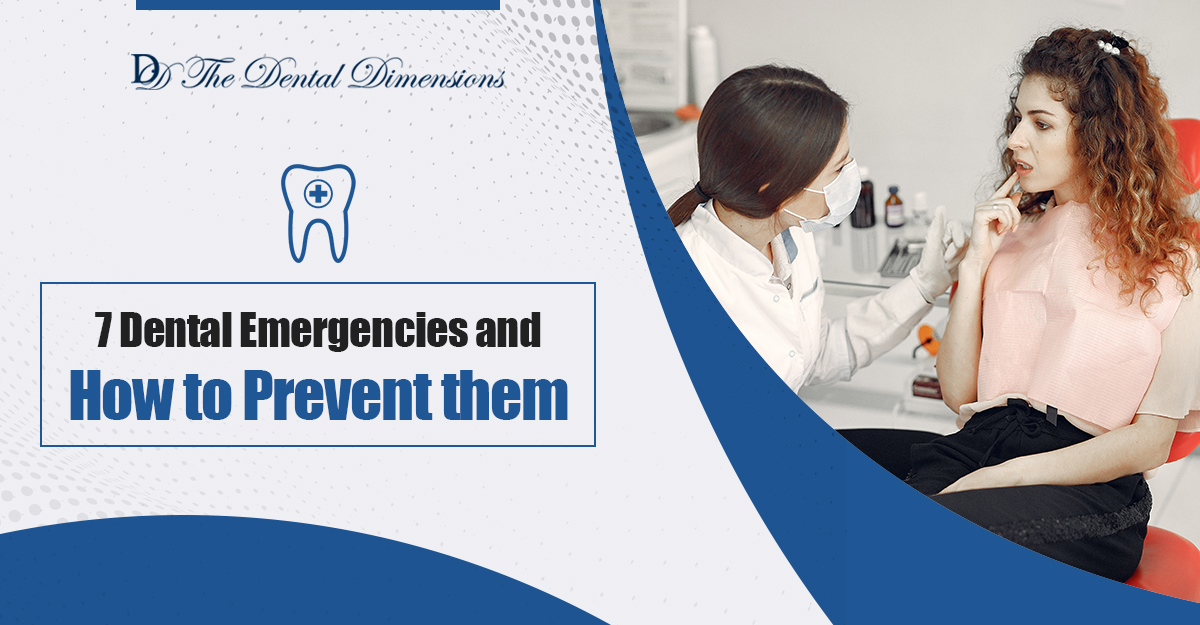At our dental practice, we understand how important it is to maintain good oral health. While regular checkups and daily hygiene habits are crucial for preventing dental emergencies, sometimes unexpected issues can arise. That’s why we’ve compiled a list of the seven most common dental emergencies and how to prevent them.
- Toothaches
Toothaches can be caused by a variety of issues, including tooth decay, gum disease, or a dental abscess. If you experience a toothache, rinse your mouth with warm water and use dental floss to remove any trapped food particles. Over-the-counter pain relievers can help alleviate discomfort until you can see a dentist.
- Broken or Chipped Teeth
A broken or chipped tooth can be caused by trauma or biting down on something hard. If you experience a broken or chipped tooth, rinse your mouth with warm water and apply a cold compress to reduce swelling. If the tooth is intact, a dentist may be able to repair it with a filling or crown. If the tooth is severely damaged, it may need to be extracted.
- Knocked-Out Teeth
A knocked-out tooth can occur due to trauma or injury to the mouth. If a tooth is knocked out, handle it by the crown, not the root, and rinse it gently with water. Try to reinsert the tooth into the socket, but if that’s not possible, store the tooth in milk or saliva until you can see a dentist. The sooner you can see a dentist, the better the chances of saving the tooth.
- Lost Fillings
Fillings can become dislodged due to wear and tear, decay, or biting down on something hard. If you lose a filling, rinse your mouth with warm water and apply a small piece of sugar-free gum or dental cement to the cavity until you can see a dentist.
- Abscessed Teeth
An abscessed tooth is a serious condition that can cause severe pain and swelling. If you suspect you have an abscessed tooth, rinse your mouth with warm salt water and apply a cold compress to the affected area. Avoid touching the affected tooth or gums and see a dentist immediately.
- Broken Jaw
A broken jaw is a serious condition that requires immediate medical attention. If you suspect you have a broken jaw, apply a cold compress to the affected area and seek medical attention immediately.
- Tongue or Lip Injury
Tongue or lip injuries can occur due to trauma or injury to the mouth. If you experience a tongue or lip injury, rinse your mouth with warm salt water and apply a cold compress to reduce swelling. If the injury is severe, seek medical attention immediately.
Preventing Dental Emergencies
While it’s not always possible to prevent dental emergencies, there are steps you can take to minimize your risk. Here are some tips for preventing dental emergencies:
- Brush your teeth twice a day with fluoride toothpaste.
- Floss daily to remove plaque and food particles.
- Avoid hard foods that can crack or chip your teeth.
- Wear a mouthguard during sports or other physical activities.
- Avoid using your teeth as tools (e.g., opening packages or bottles).
- Visit your dentist regularly for checkups and cleanings.
In conclusion, dental emergencies can be painful and inconvenient, but with proper prevention and prompt treatment, most can be resolved without lasting damage. By following the tips outlined above, you can help minimize your risk of dental emergencies and keep your smile healthy and bright. If you do experience a dental emergency, don’t hesitate to contact our office for prompt treatment.



